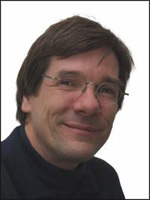Go to
Lothar Thiele
The Future of Electrical Engineering
17 December 2009, EPFL Polydome
 Lothar Thiele
Lothar Thiele
Professor and Director
Computer Engineering and Networks Laboratory
Swiss Federal Institute of Technology, Zurich, Switzerland
Webpage
Thursday, 17 December 2009 (15h30-16h15), EPFL Polydôme
Towards Electrical Engineering - Again
Society is facing enormous global challenges that can be characterized by the key words "energy" and "environmental change". Whereas the aging society is a phenomenon that is typical for industrialized countries, the increasing energy demand, the lack of corresponding (renewable) resources and the influence of industrialization as well as over-population on our environment appears to be a global threat.
Electrical Engineering should be well positioned to have a major impact in tackling the above problems:
- Communication infrastructure (from the physical to the software layer) moves from human-human information transfer to physical-physical interactions, see for example the developments in the areas of sensor networks and cyber-physical systems. Major core areas are closely related to electrical engineering such as control, information theory, signal processing, (wireless) communications, (nano- and micro-) sensors, electronic devices.
- Long lasting experience in modeling and exploiting resource interactions, such as low power systems, energy harvesting, sensing, interfaces to physical and biological systems.
- Electrical engineering has been responsible for building up the world-wide energy and power infrastructure in terms of energy conversion, production, storage and transmission.
What is missing, if we are positioned that well? Where are the potential risks for Electrical Engineering in this changing world?
- In many departments worldwide, there has been an explicit or implicit separation of EE into energy and communications. The area of communications has been renamed Information Technology and sometimes merged with or aligned to computer science. In order to have the above mentioned impact, this development needs to be questioned. Besides the associated organizational changes, there is a deep "cultural" separation between these areas in the meantime. On the other hand, closing the gap is essential to move forward to new approaches in energy saving (e.g. in buildings), energy generation, storage and distribution, e.g. by means of large-scale distributed sensing and actuation technologies.
- The trend towards Electrical Engineering as THE system science may lead to a lost identity as a core subject. Similar to the development in computer science towards biology (bio-informatics) or science (e-science) we may lose our core competence if we see our main purpose in an ancillary science towards biology (bio-sensors, biomedical engineering) or environmental sciences (sensor networks). In addition, education may involve more and more subjects form these neighboring areas and disciplinary knowledge is reduced.
As a consequence, Electrical Engineering departments should (a) attempt to close the gap between energy and information technology, (b) strengthen disciplinary education in fundamental subjects and (c) educate students to cooperate with other areas of science and engineering by means of projects.
About the speaker:
Lothar Thiele was born in Aachen, Germany on April 7, 1957. He received his Diplom-Ingenieur and Dr.-Ing. degrees in Electrical Engineering from the Technical University of Munich in 1981 and 1985 respectively. After completing his Habilitation thesis from the Institute of Network Theory and Circuit Design of the Technical University Munich, he joined the Information Systems Laboratory at Stanford University in 1987.
In 1988, he took up the chair of microelectronics at the Faculty of Engineering, University of Saarland, Saarbrucken, Germany. He joined ETH Zurich, Switzerland, as a full Professor of Computer Engineering, in 1994. He is leading the Computer Engineering and Networks Laboratory of ETH Zurich.
His research interests include models, methods and software tools for the design of embedded systems, embedded software and bioinspired optimization techniques.
In 1986 he received the "Dissertation Award" of the Technical University of Munich, in 1987, the "Outstanding Young Author Award" of the IEEE Circuits and Systems Society, in 1988, the Browder J. Thompson Memorial Award of the IEEE, and in 2000-2001, the "IBM Faculty Partnership Award". In 2004, he joined the German Academy of Natural Scientists Leopoldina. In 2005, he was the recipient of the Honorary Blaise Pascal Chair of University Leiden, The Netherlands.
Download presentation slides (15.3 MB pdf)
Secondary navigation
- EPFL Workshop on Logic Synthesis and Emerging Technologies
- Luca Amaru
- Luca Benini
- Giovanni De Micheli
- Srini Devadas
- Antun Domic
- Rolf Drechsler
- Pierre-Emmanuel Gaillardon
- Jie-Hong Roland Jiang
- Akash Kumar
- Shahar Kvatinsky
- Yusuf Leblebici
- Shin-ichi Minato
- Alan Mishchenko
- Vijaykrishnan Narayanan
- Ian O'Connor
- Andre Inacio Reis
- Martin Roetteler
- Julien Ryckaert
- Mathias Soeken
- Christof Teuscher
- Zhiru Zhang
- Symposium on Emerging Trends in Computing
- Layout synthesis: A golden DA topic
- EPFL Workshop on Logic Synthesis & Verification
- Luca Amaru
- Luca Benini
- Robert Brayton
- Maciej Ciesielski
- Valentina Ciriani
- Jovanka Ciric-Vujkovic
- Jason Cong
- Jordi Cortadella
- Giovanni De Micheli
- Antun Domic
- Rolf Drechsler
- Henri Fraisse
- Paolo Ienne
- Viktor Kuncak
- Enrico Macii
- Igor Markov
- Steven M. Nowick
- Tsutomu Sasao
- Alena Simalatsar
- Leon Stok
- Dirk Stroobandt
- Tiziano Villa
- Symposium on Emerging Trends in Electronics
- Raul Camposano
- Anantha Chandrakasan
- Jo De Boeck
- Gerhard Fettweis
- Steve Furber
- Philippe Magarshack
- Takayasu Sakurai
- Alberto Sangiovanni-Vincentelli
- Ken Shepard
- VENUE
- Panel on Circuits in Emerging Nanotechnologies
- Panel on Emerging Methods of Computing
- Panel on The Role of Universities in the Emerging ICT World
- Panel on Design Challenges Ahead
- Panel on Alternative Use of Silicon
- Nano-Bio Technologies for Lab-on-Chip
- Functionality-Enhanced Devices Workshop
- More Moore: Designing Ultra-Complex System-on-Chips
- Design Technologies for a New Era
- Nanotechnology for Health
- Secure Systems Design
- Surface Treatments and Biochip Sensors
- Security/Privacy of IMDs
- Nanosystem Design and Variability
- Past Events Archive
Links
Watch the presentations on EPFL TV
